Starting a business can be daunting for anyone. For those living through war and conflict, the challenge is even greater.
With support from the International Rescue Committee (IRC), women in Iraq are finding the courage and determination to rebuild their lives through a nine-session business training course. These sessions cover important skills from accounting and bookkeeping to communication and negotiation, but most importantly, they help women to find a niche for themselves and their businesses in their new communities.
After completing the training, women can bid for IRC small-business grants to get their enterprises up and running. The following six stories illustrate how the program works—and how women are overcoming great hardship to support their families and reinvigorate their nation.
Diana, general store owner
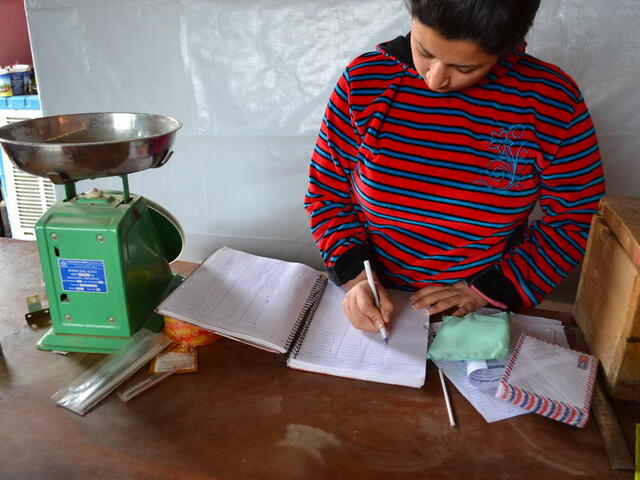
When ISIS overran her village north of Mosul in 2014, Diana* lost everything, including the stock in her general store, the only one in the village. Diana and her husband had sold their car and their gold to open it, and it was their lifeline.
“We decided to open the shop because my husband’s salary was not enough to meet our needs,” Diana recalls. “We had small children, and we needed more income to take care of the babies.”
When she returned to the village after ISIS was driven out, she found the shop empty. Desperate to get back on her feet, Diana joined the IRC business training program and, with an IRC grant, got her store up and running again.
“Before the training, I had this shop, but I didn’t have any experience about how to deal with people or do accounting,” she says. “After I went to the training, I can do the accounts… I am making more money.”
Diana has been able to set herself grander goals. “I am dreaming someday maybe I can manage another bigger shop in al-Qosh or in Dohuk,” she says. “But for now in this village, a shop like my mine is enough for the people.”
Arsala, tailor
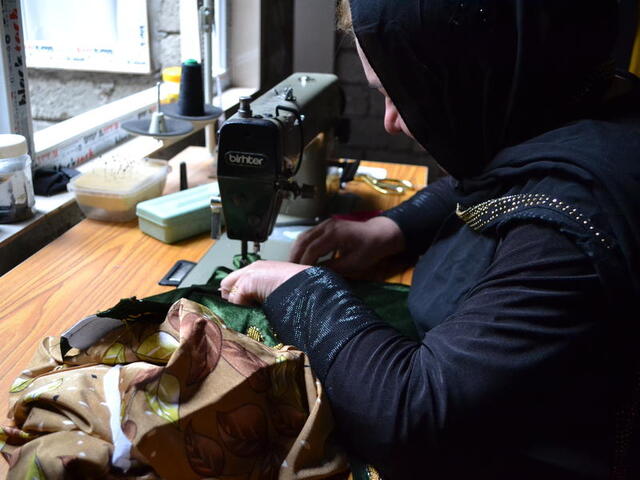
When Arsala* was just 13 she taught herself to sew. “My family didn’t have money to buy a school uniform,” she recalls of her early life in the city of Mosul. “My mother bought the material and said that we would go to a shop to get them to make the uniform. I said, ‘No, I will make it myself!’”
When her classmates saw her work, they asked her to make their uniforms, too. Arsala recognized an opportunity to earn income. Thus began a small clothing business which she ran from her home for many years, helping her to support a family of her own—until ISIS came, bringing destruction and war. Arsala and her family were forced to flee Mosul in 2014.
After months of struggling, the family settled in the town of Sheikhan, north of Mosul, and Arsala enrolled in the IRC business training program. She bought two new sewing machines with an IRC grant, allowing her to expand her offerings and increase her revenue. Today, she’s using her profits to help one of her daughters attend college.
“I’m so proud of my girl,” Arsala says. “She’s studying education at a university in Dohuk.”
One day Arsala hopes to own her own sewing workshop and employ other women in her community.
Laila, baker
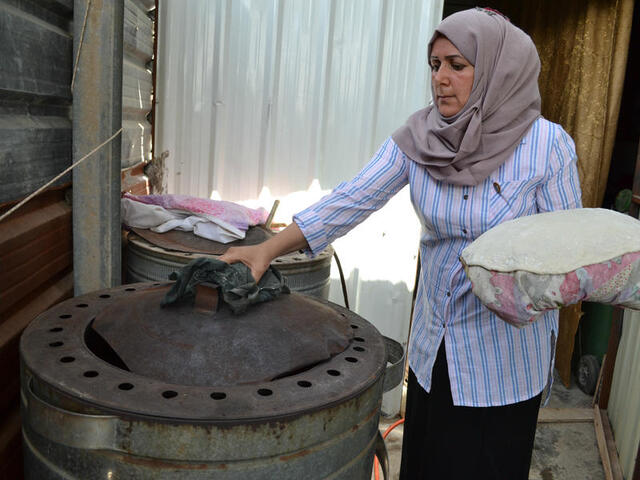
After the death of her husband a year ago—he was killed by a car bomb—Laila* and her six children fled ISIS-held al-Qaim in Anbar, south-west Iraq. The dangerous journey took them across the border into Syria to Oweriej camp in Baghdad.
In al-Qaim, Laila’s family operated a bakery. “I have been a baker for a long time,” she says. “My mother taught me how to bake.” She put her skills to work at Oweriej, obtaining an oven to make bread. Along with 15 other women in the camp, she attended IRC business training classes and applied for an IRC grant to help her buy a second oven. “Now I can bake a lot more bread and make much more profit,” she says. “I am the only bakery here in the camp so I have a lot of customers.”
Through the IRC program, Laila met other enterprising women and built an informal network. “Today we help each other a lot,” she says. “We support each other in our businesses and look after each other like family.”
The tragic death of her husband has made her business skills more necessary than ever. “I am responsible for looking after my whole family now,” Laila says. “I would like to go back to al-Qaim, but it is still under ISIS. One day want to be able to go back.”
Safia, farmer
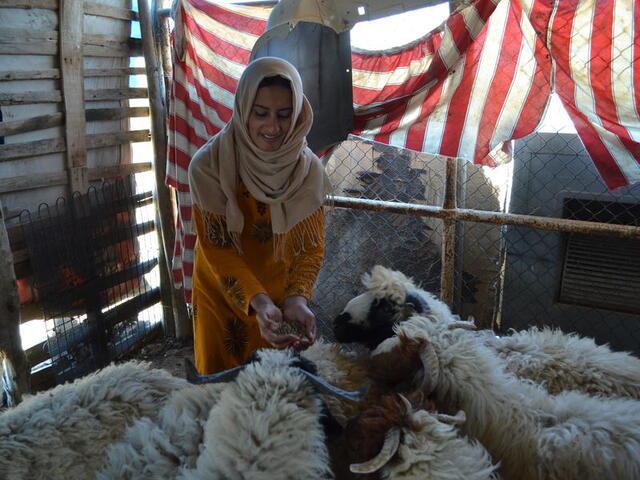
In 2014 Safia* and her family were forced to flee the town of Jalawla in central Iraq after ISIS took control. For months, she and her three children relied on relatives and neighbors to get by— until she heard about the IRC business training program and grants, which have allowed her to start a small farm raising sheep and goats.
"In the training, I learned how to account for all the expenses related to my business," Safia says.
“I know all my animals well," she adds. "I have a favorite of course—it's always the one being naughty!"
With income from the farm, Safia no longer need rely on others. All of her children are attending school. “Education is very important,” says Safia.
Hadeel, hair salon owner
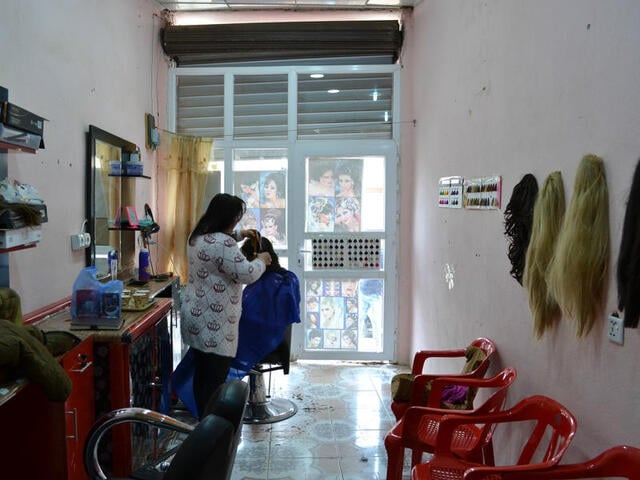
For Hadeel, working in a salon doesn’t just bring in money; it makes her happy. “I like my work a lot!” she says. “I want to stay here all the time.”
Hadeel grew up in Bashiqa in northern Iraq, where a friend who owned a salon taught her to style hair. When the friend left Iraq, she gifted the salon to Hadeel. “She trusted me, and she knew that my work was good so I could continue the salon.”
But Hadeel and her family were forced to leave Bashiqa when it fell to ISIS in 2014, relocating to Sheikhan. “After I fled, I wasn’t able to restart my salon properly,” she says. “We didn’t have money and we lived in a house that was rented.”
Hadeel enrolled in the IRC business training program, which provided her with new skills she put to use at her new salon, opened with money from an IRC grant. “The most important thing I learned was accounting,” she says. “My work is much better now. I know how every bit of money is being spent.”
Today Hadeel is teaching her new partner the skills she learned from her friend in Bashiqa. Together they plan to move into a bigger shop so their business can continue to grow.
Alia, shopkeeper, beauty salon owner and tailor
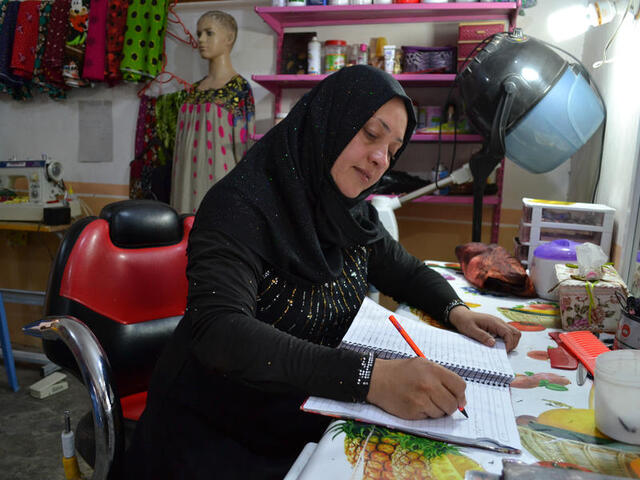
Since the death of her husband in 2009, Alia* has been the breadwinner for her family. “Life was very hard, we were struggling to get by,” she recalls “Then ISIS came.” With her mother and three children, Alia fled Saidiya in central Iraq to the town of Khanaqin.
In October 2016, Alia enrolled in the IRC business training program and then received an IRC grant to open a shop selling toys, clothes and toiletries. After a few months, she added a beauty salon to the business, then a tailoring service. In the last few weeks, she has been training local girls to sew.
“I keep a strict list of all incoming and outgoing money so I know which part of my shop my profit is coming from,” she says. “I still make the most money from selling items.”
Today Alia’s eldest daughter is attending college in a neighboring town. "Now I have a business I know can pay for all her expenses."
Alia doesn’t plan to go back to Saidiya. "Now I know that I can stand on my own two feet,” she says. “I have this shop. I have made Khanaqin my home."
**Last names omitted to protect privacy
Photos by Jess Wanless/IRC
Learn more about IRC’s work in Iraq
The International Rescue Committee works across Iraq providing relief supplies, education support, protection services, livelihood support and emergency financial assistance to displaced Iraqis, Syrian refugees and vulnerable locals. Supported by UN Women, the IRC is supporting women to rebuild their lives through starting new businesses.
Learn more about livelihoods
Many displaced women want to work but face hurdles. The gig economy, with protections for workers, could help change that.
Read a new report: Syrian women refugees in Jordan: opportunity in the gig economy?